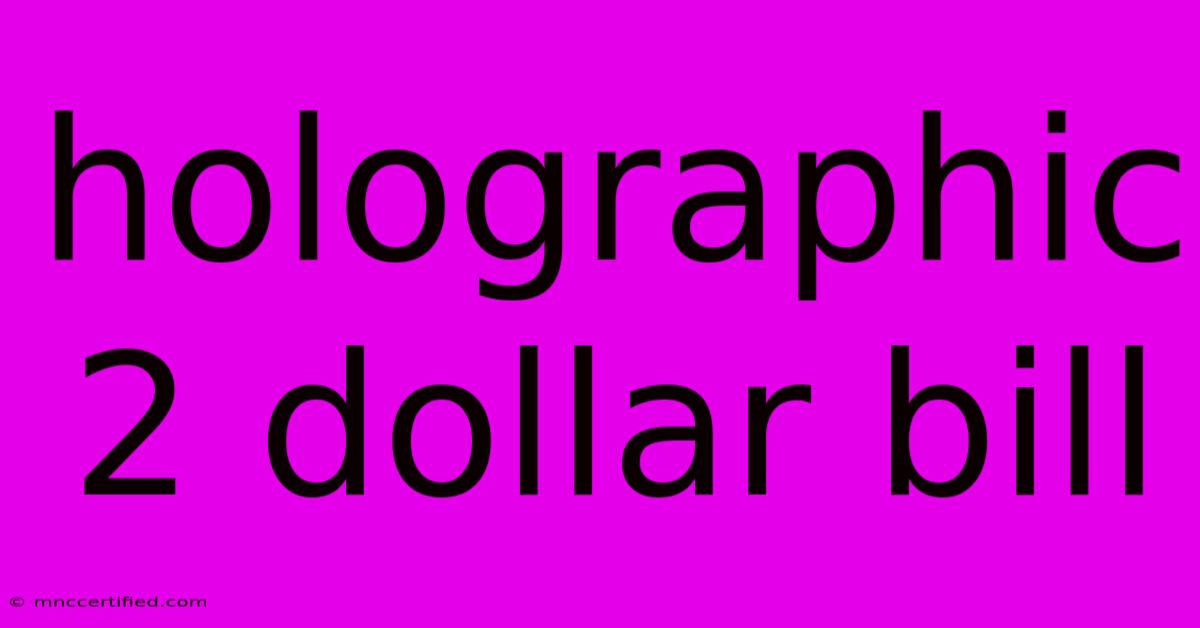Holographic 2 Dollar Bill

Table of Contents
Holographic $2 Bill: Separating Fact from Fiction
The internet is awash with rumors and misinformation. One persistent myth revolves around a supposed holographic $2 bill. This article will delve into the truth behind this claim, exploring the features of genuine $2 bills and debunking the idea of a holographic version. We'll also examine why such a rumor persists and offer tips on identifying counterfeit currency.
Understanding the Real $2 Bill
The United States $2 bill, while less commonly circulated than other denominations, is perfectly legal tender. It features a portrait of Thomas Jefferson on the front and a depiction of the signing of the Declaration of Independence on the back. Crucially, it does not include any holographic security features. The bill incorporates several security elements, however, including:
- Watermark: A faint image of Thomas Jefferson is visible when held up to a light source.
- Security Thread: An embedded vertical thread with the letters "USA" and the numeral "2" printed on it.
- Microprinting: Tiny lettering found in various places on the bill.
- Intaglio Printing: The raised ink used to print the portrait of Jefferson.
These security measures are designed to prevent counterfeiting, but none involve holographic technology. The absence of a hologram is a key characteristic of an authentic $2 bill.
Debunking the Holographic $2 Bill Myth
The persistent rumor of a holographic $2 bill likely stems from several factors:
- Misinformation Spread Online: False information readily circulates on social media and various online forums.
- Confusion with Other Currency: Other countries might utilize holographic features on their currency, leading to misunderstandings.
- Desire for Rarity: The relative scarcity of the $2 bill itself contributes to the allure of fabricated stories surrounding it.
There is no evidence of a legitimate holographic $2 bill ever being issued by the United States Bureau of Engraving and Printing. Any claim to the contrary is false.
Identifying Counterfeit Bills
While there's no holographic $2 bill, counterfeit currency is a real concern. Here's how to identify potentially fake bills:
- Feel the Paper: Genuine bills have a distinct feel; counterfeit bills often feel flimsy or different.
- Check the Watermark: Look for the clear watermark of Thomas Jefferson when holding the bill up to a light.
- Examine the Security Thread: The security thread should be embedded and clearly visible.
- Inspect the Printing: Look for inconsistencies in the printing quality, blurry images, or misaligned elements.
- Use a Counterfeit Detector Pen: These pens use iodine to detect starch in the paper, which is absent in genuine currency.
If you suspect a bill is counterfeit, do not attempt to spend it. Instead, contact your local law enforcement agency.
SEO Optimization Considerations
This article incorporates several SEO best practices:
- Target Keywords: "holographic $2 bill," "$2 bill," "counterfeit money," "identify counterfeit," "US currency," "security features."
- Header Structure: Clear H2 and H3 headings improve readability and SEO.
- Bold Text: Emphasis on key phrases improves readability and highlights important information.
- Long-form Content: Comprehensive articles rank better than short, superficial ones.
- Natural Keyword Integration: Keywords are used naturally within the text, avoiding keyword stuffing.
By addressing the prevalent myth surrounding a holographic $2 bill directly and providing valuable information on identifying counterfeit currency, this article aims to both inform readers and rank well in search engine results. Remember, always rely on official sources for information about US currency.

Thank you for visiting our website wich cover about Holographic 2 Dollar Bill. We hope the information provided has been useful to you. Feel free to contact us if you have any questions or need further assistance. See you next time and dont miss to bookmark.
Featured Posts
-
Smart Insurance Orange Tx
Dec 10, 2024
-
Understanding Bellas Yellowstone Role
Dec 10, 2024
-
Julie Stevens Dead At 87 Obituary
Dec 10, 2024
-
Does Lofta Take Insurance
Dec 10, 2024
-
Live Score West Ham Vs Wolves Chances Missed
Dec 10, 2024